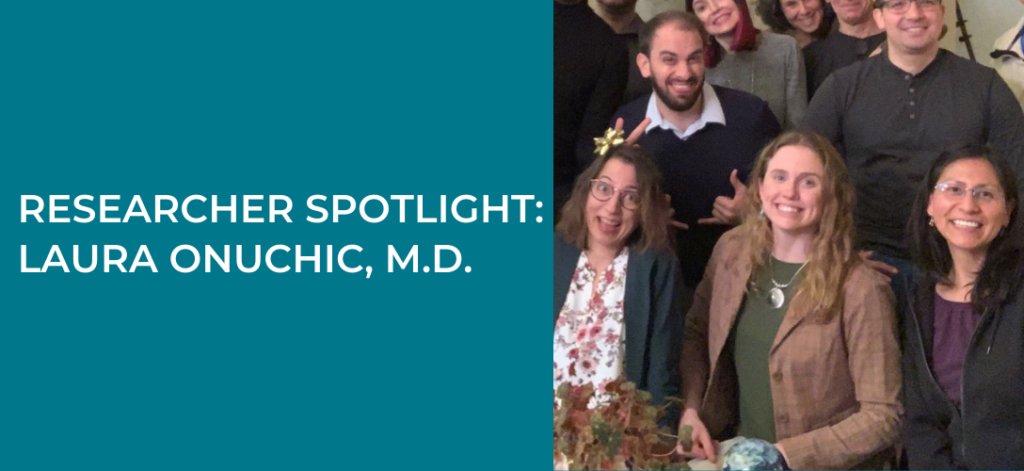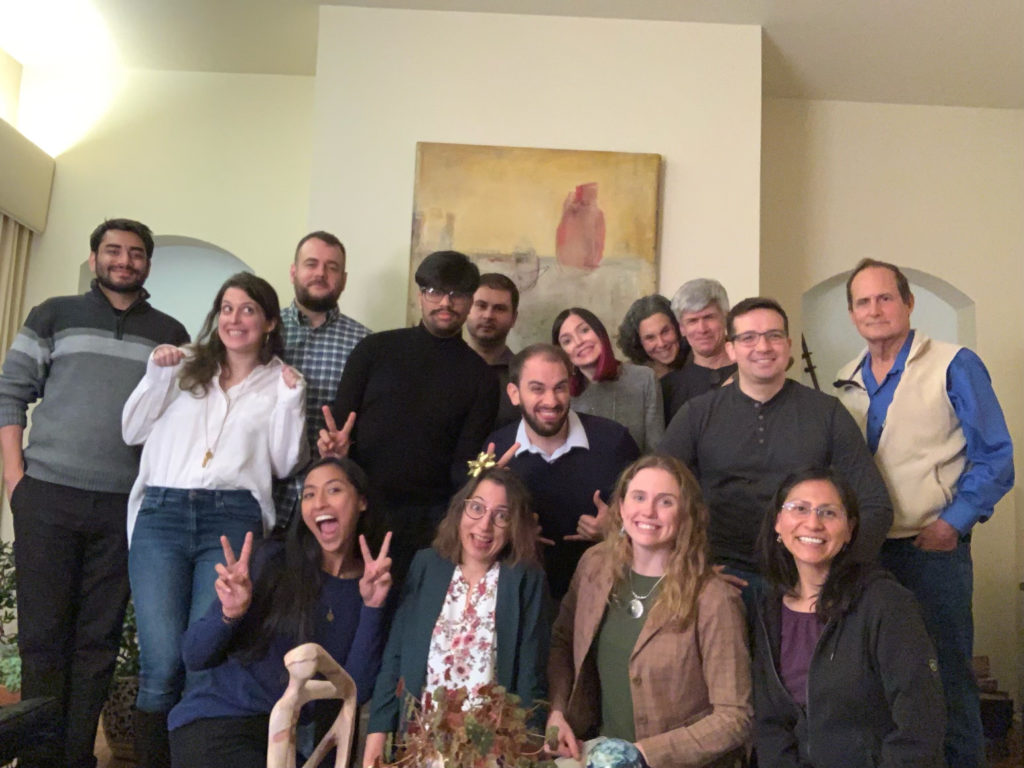
Published on June 28, 2022 |
Laura Onuchic, M.D., Yale School of Medicine

Laura (front row, center right) and Caplan lab team.
How did you first get involved in PKD research?
Laura Onuchic: The fight against PKD has been a part of my life for as long as I can remember. Both my parents are incredible medical doctors in my home-country, Brazil. More specifically, my father is a physician-scientist in nephrology who’s made substantial contributions to the PKD field, including the identification of the PKHD1 gene (responsible for ARPKD) during the early stages of his career. His approach to research and to patient care has always been incredibly inspiring. In fact, my sister and I are also nephrologists and my younger brother is now in internal medicine (and I married a nephrologist as well)! When I was growing up, I recall listening to stories about large families affected by PKD and all the suffering this disease caused.
From a personal perspective, it’s motivating to fight a disease that affects so many families alongside my own family. When I reached the point of my career where I myself was responsible for these patients, I realized that, from the clinical perspective, our options to help these families were still rather limited. At the time, I was finishing my clinical nephrology fellowship in the largest hospital complex in Latin America (Hospital das Clínicas da Universidade de São Paulo) and had the opportunity of meeting Dr. Michael Caplan, chair of cellular and molecular physiology at Yale University and a leader in the PKD field, who offered me a postdoctoral position at his laboratory.
I’ve now been part of Dr. Caplan’s laboratory for three years, and I’m extremely excited about the progress we’ve made with this research and how it could impact the lives of many patients in the future.
What are you currently working on?
Laura Onuchic: I’m working on opening the doors to the exploration of gene therapy approaches in PKD. The vast majority of Autosomal Dominant Polycystic Kidney Disease (ADPKD) cases are caused by a genetic mutation in the PKD1 gene, which consequently encodes a defective polycystin-1 (PC1) protein. In my current project, we expressed the C-terminal tail of PC1 (a segment that represents only 5% of the total PC1 protein) in PC1-deficient ADPKD pre-clinical mouse models. We showed that this was sufficient to significantly slow disease progression and preserve kidney function.
What would you like the patient community to know about your research?
Laura Onuchic: Not a day goes by where we don’t have our patients in mind as we conduct our research. They motivate us to be better professionals, and their involvement with the medical and scientific communities is inspiring. I really trust that we have made major progress over the past couple years. I’d like the patient community to know that we will work harder and harder every day in the hopes of eventually transitioning these pre-clinical findings to patient care and treatments for PKD.
Do you have a personal connection to PKD?
Laura Onuchic: I don’t have any close friends or family affected by PKD. I do, however, feel a strong personal connection to PKD from my family and my work in the Caplan laboratory in the sense that we’re all working together toward a treatment and support one another in the “fight against PKD.” During my clinical work, I connected and learned so much from the patients and families that battled PKD alongside me. One of the strongest connections I’ve ever had with any patient was with a 34-year-old elementary school teacher back in Brazil who suffered from an aggressive form of ADPKD. We became extremely close and, to this day, she is still an inspiration to me.
What excites you most about this research?
Laura Onuchic: This answer is easy— the translational potential that this project presents is extremely hopeful! The idea that we may eventually be capable of delivering the C-terminal tail of polycystin-1 using gene therapy strategies and that this could eventually suppress cyst formation in patients is groundbreaking.
What are some of your personal interests outside of research?
Laura Onuchic: I’m a huge sports fan! In fact, I was a ranked collegiate swimmer back in Brazil. As a Brazilian, I also watch a lot of soccer, but American sports have grown on me over the past couple years. I also love to travel and I’m particularly passionate about ecotourism. I’ve backpacked all around South America, Central America, and have already seen quite a bit of North America as well. Having the chance to appreciate magnificent wildlife and interact with local communities has been an extremely enriching experience.
Did you enjoy Dr. Laura Onuchic’s story? Want to learn more about others funded by the PKDF? Find them here! And check out other recent researcher spotlights.









Our all family is suffering fron this curse and i am also affected on it hence always have pain on both kidney side
Thank you for working on what looks to be a promising therapy! My brother and I are both ADPKD patients and have both received kidney transplants after going through a few years of hemodialysis. Anything that could help future patients would be very welcome! We both progressed too far to take Tolvapten by the time we needed dialysis.
Me gustaría recibir mayor información yo tengo ADPKD tanto en riñones como hígado, tengo cirugía de hígado un destechamiento hepático y control contante nefrológico. Tengo problemas de retención de líquidos e hipertención arterial que con frecuencia se me altera. Sin embargo en mi país Ecuador los médico no tienen mayor acceso a tratamiento para la enfermedad a pesar de todos los problemas que tengo solo me medican con hipertensivos y diuréticos que no ayudan mucho. Mi temor es que la presión arterial descontrolada me pueda causar daños a largo plazo o producirme un infarto y derrame.
Congratulations Laura! We missed you at Hospital das Clinicas at São Paulo University, but we know that you merit to grow and grow in your carrier!
We are very proud of you!
Claudia MB HELOU